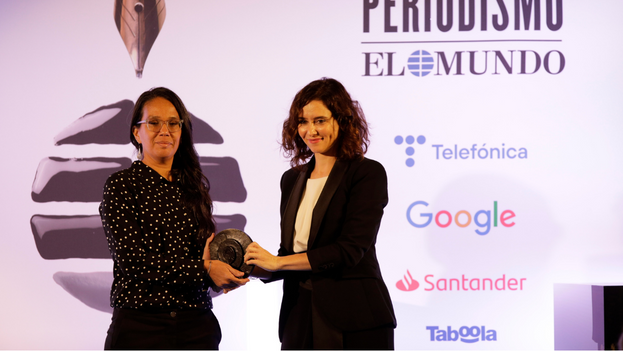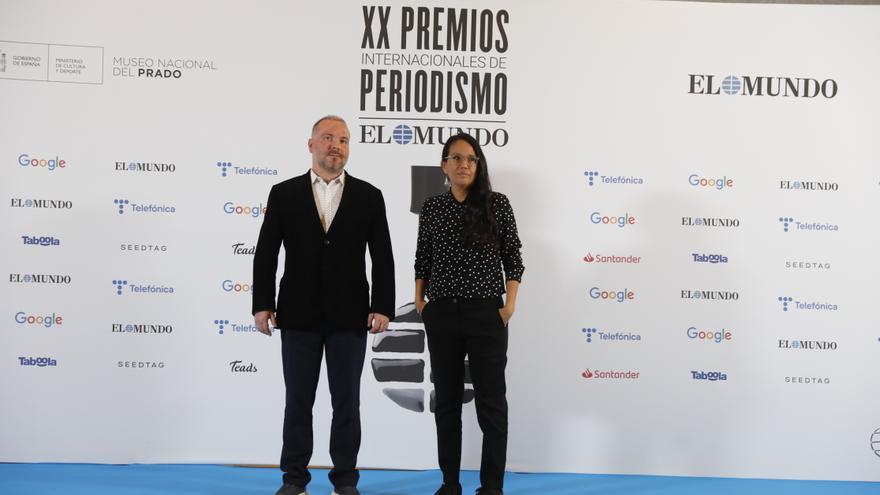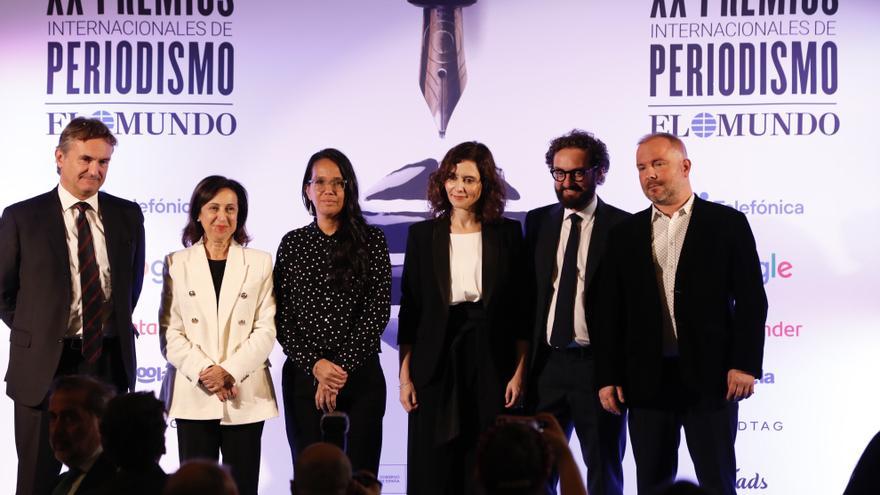
![]() 14ymedio, Madrid, Havana, 19 October 2022 — Cuban journalist Luz Escobar, member of the editorial staff of 14ymedio and winner of the Press Freedom Award of the Spanish newspaper El Mundo, declared on Wednesday night that, thanks to independent reporters, Cuba has “its own voice.”
14ymedio, Madrid, Havana, 19 October 2022 — Cuban journalist Luz Escobar, member of the editorial staff of 14ymedio and winner of the Press Freedom Award of the Spanish newspaper El Mundo, declared on Wednesday night that, thanks to independent reporters, Cuba has “its own voice.”
The award ceremony of the XX International Journalism Awards, chaired by Isabel Díaz Ayuso, president of the Community of Madrid, was held at the Museo Nacional del Prado. During the celebration, exiled Russian reporter Alexey Kovalev, director of investigative reporting at the Meduza newspaper, also received the Best Labor Journalism Award.
Escobar alluded in her speech to the difficulties Cubans have in leaving the Island, subject to the control of the regime and as “hostages of a power that treats us like small children who are forbidden to travel.”
She also pointed out that, in Cuba, the word “journalist” is equivalent to that of “enemy,” and she described the ruling media as “propaganda spaces for the only party allowed. In the faculties of journalism, we are taught to revere the Government without questioning, and the list of prohibited subjects is too long for one article,” she said.
On the dangers of the profession, Escobar denounced the “strangulation of the press” by the Government, whose objective has been to “impose a single narrative about what was happening inside and outside the Island.” “Assassinating journalism,” she said, has been the task of those who have been plotting a “triumphalist story about the national situation” for six decades, while attributing to Europe and the rest of Western democracies a “catastrophist” panorama.

As examples of the regime’s media manipulation, Escobar said that the phrase “special military operation” that the official media gave to the Russian invasion of Ukraine, following direct instructions from the Kremlin, justified the conflict and denigrated opposition reporters like Kovalev.
Independent journalism was born as an alternative to that story, she said. According to Escobar, its origins are in the regime’s prisons, “when a political prisoner sent the first piece of paper, precariously written, to report a beating,” issued “a complaint through a restricted phone call” or “painted a symbol on a wall.”
Founders such as the poet and journalist Raúl Rivero, one of those convicted during the so-called Black Spring of 2003, or her own father, Reinaldo Escobar, censored by the regime in 1988, have served as inspiration when it comes to assuming the “high personal, family and social cost” of her work.
Escobar denounced the arbitrary arrests, threats and police cordons she has suffered in her own house, in addition to campaigns to “destroy my reputation.” “After July 11, 2021,” she said, “Cuban authorities have become much more susceptible to information,” and are paying greater attention to social networks and independent media content.
In addition to a thorough repression against those who expressed their desire for change and freedom on that date, the regime has forced dozens of reporters to renounce their profession in what the journalist described as “a twist of censorship.”
However, “we have shattered the regime’s old monopoly of recounting reality,” said Escobar, who also alluded to her work in the 14ymedio newsroom, which continues publishing “despite the repression, threats and blocking of its website on Cuban servers.”
The newspaper has helped to “elevate press standards on the Island” and demonstrates that “journalism can inform with immediacy and quality.”

For his part, Alexey Kovalev, forced into exile after legislation from the Russian Parliament that criminalized independent journalism, stated that Putin’s war against Ukraine “is based on a lie,” so his job is to defend the truth. The reporter, whose family remains in Moscow, thanked El Mundo for its recognition of the importance of the free press.
In praise of the winners, Isabel Díaz Ayuso pointed to Escobar and Kovalev as “examples of journalism as a fourth power and commitment to freedom.” “Democracy is not something that is conquered forever but must be defended, and this isn’t possible without freedom of the press,” she added.
She claimed that in international spaces it’s necessary to “call things by their name,” which implies “saying that Cuba is a dictatorship and its government, tyrannical.” As for Escobar, she said that in addition to being a journalist, she is a mother, something that the regime has used against her. She also commented that those responsible for El Mundo had to make numerous arrangements so that the reporter could attend the ceremony with her daughters.
The award reception dinner, organized by Joaquín Manso and Marco Pompignoli, directors of El Mundo and the Unidad Editorial group, respectively, was attended by Escobar’s family and colleagues, in addition to Cuban activists and intellectuals Dagoberto Valdés, Yoandy Izquierdo, Yunior García Aguilera, the Venezuelan politician Leopoldo López, and the Spaniards Adolfo Suárez, Jr., Inés Arrimadas and Edmundo Bal.
The guests also attended the temporary exhibition “Another Renaissance,” in the Prado Museum, which has collected the work of Spanish artists in Naples at the beginning of the Cinquecento, the 16th century period of Italian art that reverted to classical forms.
Translated by Regina Anavy
____________
COLLABORATE WITH OUR WORK: The 14ymedio team is committed to practicing serious journalism that reflects Cuba’s reality in all its depth. Thank you for joining us on this long journey. We invite you to continue supporting us by becoming a member of 14ymedio now. Together we can continue transforming journalism in Cuba.
